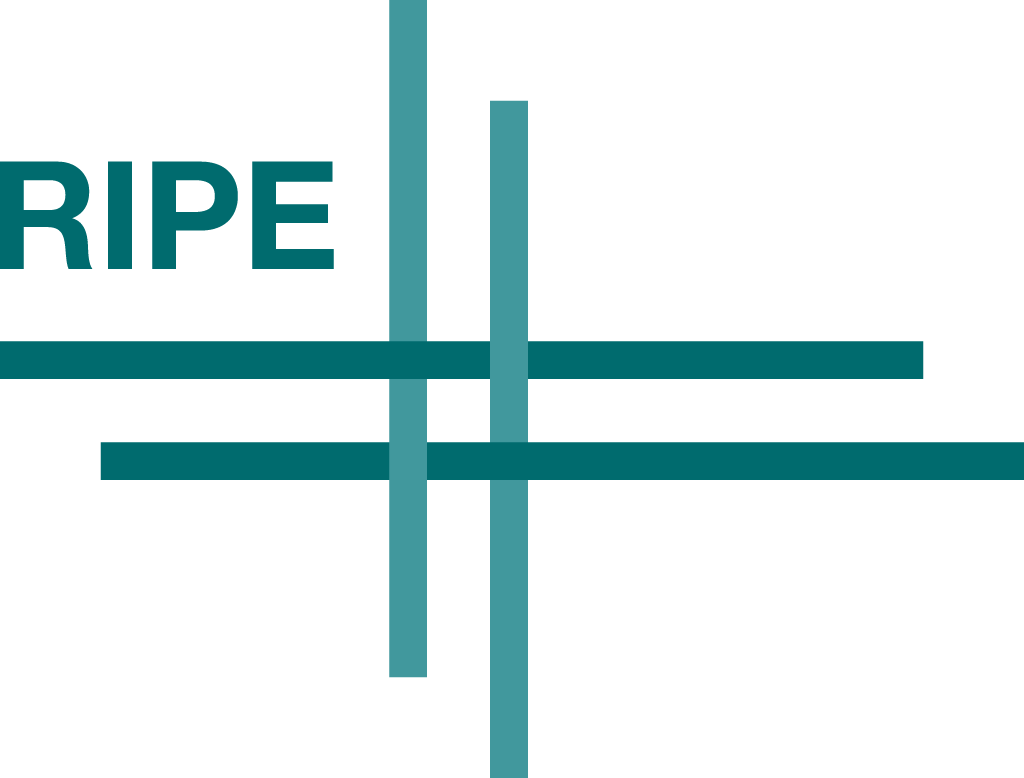Monday, 20 May
Velkomin í Reykjavík! RIPE 78 has begun in the land of ice and fire and datacentres. This RIPE Meeting has gotten off to a flying start, with 597 attendees checking in at Iceland from 58 countries, of whom 163 are attending their first RIPE Meeting.
And maybe this will be our biggest meeting ever. (Ok we said that last year in Amsterdam as well…and it was!) How can you find out for sure? Well, you’ll have to keep checking back here!
And of course, this RIPE Meeting celebrates 30 years of the RIPE community, so do share your best memories (we’re using #RIPEturns30).
Highlights from Day 1
-
- We got started with three very interesting tutorials
- Our many newcomers (possibly the most newcomers ever) were welcomed by Hans Petter Holen and Axel Pawlik. If you missed it, you can still check out their RIPE Meeting 101
- Hans Petter Holen opened the meeting with the threat of a GoT spoiler, but thankfully went on to talk about what’s happening with other initiatives like the new RIPE Meeting Code of Conduct, the RIPE Chair Selection process, the BoFs and much more.
- In a RIPE Meeting first, Ólafur Guðmundsson addressed the audience in Icelandic in his very talk, which asked the very fundamental question – ‘What Do We Know About an IP Address?’ and also introduced the word ‘Craptimization’.
- Ali Safari Khatouni shared the results of his research on roaming across Europe
- The second plenary session saw talks by Mikhail Korshunov, CISCO Systems Inc on streaming telemetry and Kemal Sanjta, Thousand Eyes on network monitoring.
- Melanie Buck’s lightning talk about how the Women in Tech initiative at GoDaddy also inspires clients did a great job of setting the stage for the Women in Tech session taking place on Wednesday.
- Chris Amin of the RIPE NCC explained a bit about how to measure DNS without breaking anything, and possibly gave the RIPE NCC a new motto, “We don’t just serve, we also care.”
- And in the final lightning talk, Enno Ray, ERNW, asked whether 2019 will finally be the year of Linux and IPv6-only in Wi-Fi networks. We don’t have the answers, but Enno might just!
- It was a packed day as the RIPE Big Picture BoF and BCOP Task Force took place simultaneously, as the Newcomers’ Reception swung into action.
No Game of Thrones spoilers were revealed in the course of Day One, but we can’t make any promises for tomorrow. What we do promise though, is that we’ll bring you the highlights of what happens every day right here, so make sure to keep reading.
Our favourite tweets from Day 1
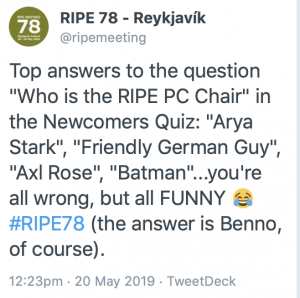
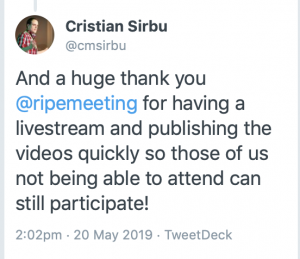
Tuesday, 21 May
A bit of rain, a lot of clouds and brief moments of sunshine in Reykjavík today but no matter, RIPE 78 was up and running with a full day of plenary presentations. We welcomed 664 attendees by the end of the day, including 177 newcomers.
Highlights from Day 2
- All things DDoS and BGP in the 9:00 session and a pilot using an online Q&A tool – it seemed to work really well!
- David Huberman drives the point home that currently there’s no financial support for a DNS root server operator and ICANN has a new proposal to look at the financial systems underpinning root server operations
- Roland van Rijswijk delved into OpenIntel’s active measurement of DNS and how it can help improve DNS resilience and security.
- All presentations received a lot of interest and triggered several follow-up questions.
- Geoff Huston reminded the audience of how little we know about DNS, and even how the KSK roll was for the large part unpredictable, hard to measure and incredibly lucky. And he shared what he thinks we can all learn from this
- Will economic factors affect IPv6 deployment? Brenden Kuerbis and Milton Mueller dive deep into IPv6 modelling
- Alex Band thinks you should run your own RPKI Certificate Authority and puts a pretty strong case forward
- The day ended with the RIPE Chair Selection Process BoF; it was agreed to move forward by sharing the documents on the Address Policy WG and RIPE NCC Services WG mailing lists and kick off the call for consensus in the closing plenary on Friday
And then, of course, the social: a networking event at Whales of Iceland!
See you tomorrow for the first day of RIPE Working Group sessions.
Wednesday, 22 May
Wednesday was all about working groups. Here are some of the highlights from the day.
Address Policy I
- First up was Remco van Mook with a new policy proposal (not yet formally entered into the PDP) on updating the IXP assignment policy. Noteworthy changes include increasing the size of the reserved IPv4 pool for IXPs to a /15 (from a /16), and reducing the maximum assignment size to a /23.
- In Marco Schmidt’s summary of recent policy developments, he noted that there was a staggering 41 policy proposals currently being discussed across the other four RIR communities, though he wouldn’t confirm how many of these were from the same proposer.
- Nikolas Pediaditis provided feedback from the RIPE NCC’s Registration Services Department, noting that the IPv4 pool might not last beyond RIPE 79 in Rotterdam. But interestingly, it appears the RIPE NCC may be set to run out of IPv6 first! To avoid this, it will soon be the first RIR to ask for a refill, in the form of another /12 from IANA/PTI.
Connect
- Who is connect? When the chairs asked for a show of hands, these were the biggest groups (from largest to smallest): 1) IXPs, 2) ISPs, 3) Content, 4) Enterprise, 5) Educational networks.
- Nick Hilliard gave a follow up on his presentation from RIPE 77 and shared some of the progress INEX has made in the field of RPKI, along with some lessons learned on the way.
- Arturo Servin from Google talked about how they were planning to implement BGP filtering using the IRR.
Address Policy II
- Sander Steffann gave a brief update on his proposal to reduce the IPv4 allocation size to a /24. The policy would kick-in once the RIPE NCC’s remaining IPv4 pool is gone, allowing more organisations to receive (smaller) blocks of returned IPv4 addresses via a future waiting list.
- In the open policy hour, Ruediger Volk talked about the extended delegated statistics that are published by the RIRs, highlighting some failings with the files that had been published. He asked for better-quality data according to a more unified format.
Open Source
- Wolfgang Tremmel and Sander Steffann presented their work on using docker and other virtualisation techniques for creating labs to teach about routing. Many in the audience found this work interesting and were keen on trying it out.
- Max Rottenkolber’s work on high performance encryption on standard hardware also drew a lot of interest and questions.
- Finally, Mirjam Kühne and Charles Eckel’s presentation about IETF and RIPE hackathons was well-received. Both of these hackathons are delivering good projects. People were interested in learning from the experiences to improve hackathons in other areas.
Cooperation
- A discussion of the relationship between the Council of Europe and Internet companies examined how businesses and democratic institutions can cooperate to fight the spread of misinformation and other challenges.
- A detailed look at what’s happening in the ITU following last November’s Plenipotentiary Conference in Dubai, touching on the outcomes of the event, but also exploring reactions to increasing divisions that stand between the organisation’s members.
- The discussion of digitised hate speech – or “flaming” – delved into the implications of online hate speech for the Criminal Justice System and questions about freedom of expression, prompting questions about practical problems for defining, identifying and banning flaming.
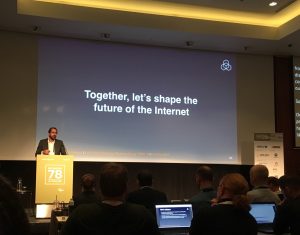
RIPE NCC Services
- RIPE NCC update from Axel Pawlik, followed by the Operational Update from Felipe Victolla Silveira.
- A presentation on Due Diligence at the RIPE NCC by Athina Fragkouli, followed by a robust discussion on the closure of members and the RIPE NCC’s approach to due diligence.
- A call from Fergal Cunningham to fill out the RIPE NCC survey, which opens on Friday and stays open until the end of June.
- A presentation from Sergey Myasoedov on the 10 year anniversary of the 2007-01 “Direct Internet Resource Assignments to End Users” policy implementation.
- Finally, an analysis from Ruediger Volk on the accuracy of the NRO’s extended delegated stats, before we were all kicked out for the General Meeting!
Thursday, 23 May
Thursday at RIPE 78, another day packed with packed with parallel WG sessions. Here’s an overview of the day.
IPv6
- Two helpings of IPv6 today, the first following the usual meeting style with presentations from well known IPv6 enthusiasts such as Jan Zorz and Enno Rey, and the other taking the form of a joint session with the Routing WG after lunch.
- Jan Zorz presented the latest news about an Internet Draft being discussed at the IETF on the reaction of SLAAC to renumbering events, with a request for feedback from operators.
- Another point of discussion were the measurements presented by Geoff Huston, showing the breakage in IPv6 implementation across operators all over the World.
- Taking a deep dive into modern router architectures, we experimented with a longer session dedicated to explaining specific topics for the network operators at the RIPE Meeting. This was meant as a test to ask the audience if any more of such sessions should be held in the future. The reaction from the audience was very positive, with many people stepping up to the microphone and volunteering for future sessions.
Anti Abuse
- Angela Dall’Ara’s update on Abuse-c policy sparked discussion over whether there’s any need for a change in the current policy.
- Questions were raised about self-regulation in response to a presentation looking at policy proposal 2019-03.
- Samaneh Tajalizadehkhoob presented on a growing need for proactive detection and mitigation strategies by TLD operators and registrars.
Routing
- Geoff Huston examined how quickly routing space is growing and what his projections for future BGP FIB size are, along with a very interesting historical overview of how routing has developed over the years in his talk Routing and Addressing in 2018.
- Job Snijders spoke about RPKI and Current State of Routing Security and made creative use of his tie.
- Andrei Robachevksy called for greater transparency in routing data and invited interested community members to help him develop a prototype.
- And Chris Amin from RIPE NCC asked the audience to try out and share their feedback about the newest tool in the making – RIS Live.
- Niels ten Oever brought some offline concerns into the Routing WG with his talk on ethics in routing
IoT
- Jim Reid opened the working group informing attendees that he will be standing down as chair around this time next year.
- Patrik Fältström (Netnod) presented remotely. Jim Reid thanked Patrik for his contribution, adding that the study group was important. Reid requested the audience to approach their country’s ITU representatives, governments or regulators, and explain to them any problems they are aware of.
- Mirjam Kühne presented RIPE Atlas in the IoT WG with many audience members confirming they had an Atlas probe. Mirjam invited those who didn’t have a probe to see her colleague Michela.
Database
- Denis Walker (DB WG co-chair) proposed that it was time to think about personal data in the RIPE Database, to ensure compliance with data protection laws. There was much discussion around this, and the idea of a task force was put forward, to define the purpose of the RIPE Database. Such a purpose document would help define requirements and design of the future RIPE Database.
- Edward Shryane’s proposal to clean up locked person objects in the RIPEDatabase was well-received.
- Job Snijders talked about his policy to delete route objects in theRIPE-NONAUTH IRR if they’re in conflict with Route Origin Validation (ROA) records. There was some discussion about the hold down time for this, that perhaps 7 days was too short. Job encouraged discussion in the routing WG.
DNS
- Anand Buddhev gave an update on DNS operations at the RIPE NCC, followed by Marco Hogewoning’s talk on the ongoing efforts to clean up ENUM..
- Joao Damas shared his insights on the wrap up of the Root KSK Rollover.
- Carsten Strotmann stepped up to give two talks, the first an overview of the DNS privacy landscape and the second a look at Unwind, a local DNS resolver aimed at mobile devices.
MAT
- Massimo Candela, NTT Communications, gave an interesting presentation about measuring the Internet in the Middle East. It was received very well and people made lots of suggestions what other analyses he could include.
- Te-Yuan Huang, Netflix, presented about the buffer sizes they’re observing at Netflix. Others confirmed that her conclusions match with other similar studies. Usually small buffers result in better user experience.
- Katarzyna Wasielewska, RACI fellow from the State University of Applied Sciences in Elblag talked about her study on passive bandwidth measurements.
- Jari Arkko, Brian Trammel, IETF QUIC WG, was wondering if measurements are still possible in the era of encryption. He then gave a short update on the QUIC protocol and then showed how measurements can be done with the spin bit.
- Chris Amin, RIPE NCC, gave an update about the tools the RIPE NCC is providing. Lots of good feedback, especially about the RIS live stream. People were also interested in the possibilities to put RIPE Atlas on mobile phones.
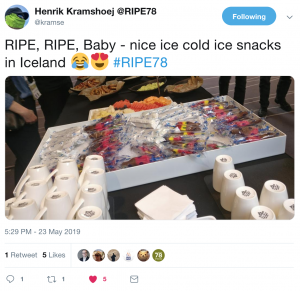
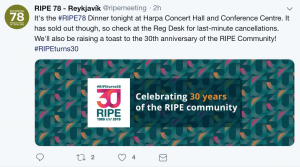
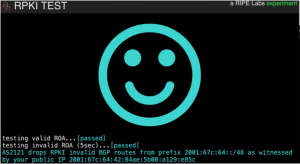
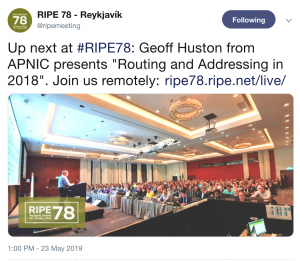
Friday, 24 May
The fifth and final day of RIPE 78 saw 742 attendees checked in, making it the second biggest RIPE Meeting.
Friday Programme Highlights
- An update on the IANA Review Committee followed by an update from the ASO Address Council where the recommendation arose to open the ASO meetings for public.
- A presentation on the RPKI Wayback Machine during which the speaker praised the role of RIPE NCC in archiving the RPKI repositories.
- Between plenary sessions, an announcement of the RIPE NCC General Meeting voting results for the May GM, with Remco van Mook re-elected as member of the Executive Board and Ondřej Filip newly elected.
- A talk on best strategies and conduct for good peering.
- The closing remarks from the RIPE Chair thanking attendees for making their way to RIPE 76, and a special thank you to the WG co-Chairs, the PC, and of course, the stenographers.
Meeting Statistics
- 742 attendees checked in
- 199 newcomers (27%)
- RIPE Networking App (totals for the week): 384 participants; 966 messages; 1298 meetings!
- Attendees from 60 countries
RIPE Working Group Co-Chair Changes
- Routing WG: Paolo Moroni stepped down as WG co-Chair.
- IoT WG: Sandoche Balakrichenan joins Jim Reid.
- NCC Services: Rob Evans joins Kurt and Bijal.
RIPE Programme Committee changes
- Benno Overeinder stepped down having reached the end of his term.
- Franziska Lichtblau was re-elected and Jelte Jansen joins the RIPE PC.
Thanks for making this such a great meeting – see you all at RIPE 79 in Rotterdam!


